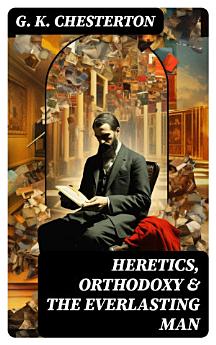Heretics, Orthodoxy & The Everlasting Man: Chesterton's Works on Christianity & Spirituality (Including Author's Autobiography)
Dec 2023 · DigiCat
5.0star
1 reviewreport
Ebook
809
Pages
family_home
Eligible
info
reportRatings and reviews aren’t verified Learn More
About this ebook
In "Heretics, Orthodoxy, and The Everlasting Man," G. K. Chesterton presents a compelling exploration of theological and philosophical themes that profoundly critique modern secularism while affirming the value of traditional Christian beliefs. Through a series of essays, Chesterton employs his characteristic wit and engaging style to dissect the intellectual currents of early 20th-century thought, juxtaposing heretical ideas with orthodox Christianity. Each essay serves as both an indictment of contemporary materialism and a celebration of the spiritual narrative that defines humanity's quest for meaning, revealing his mastery in blending polemical argumentation with rich, vivid prose. G. K. Chesterton, a prolific writer known for his sharp insights and vivid imagination, drew inspiration from his own struggles with faith and reason, as well as his keen observations of societal changes in his time. His background as a journalist and biographer, along with his fascination for paradox, allowed him to articulate profound truths about human existence in an accessible manner, making his work compelling and enduring. Chesterton's deep affection for the mystery of faith and the absurdities of modern life shaped these texts, providing a unique lens through which to explore enduring moral questions. This collection is a must-read for anyone seeking to understand the interplay between faith, culture, and intellect. Chesterton's engaging prose and profound insights invite readers into a thoughtful reflection on the underlying truths that shape human belief and existence. "Heretics, Orthodoxy, and The Everlasting Man" not only challenges prevailing ideologies but also reaffirms the relevance of faith in everyday life, making it a timeless resource for scholars and casual readers alike.
Ratings and reviews
5.0
1 review
About the author
G. K. Chesterton (1874-1936), a towering figure in English letters, distinguished himself as a versatile writer, laying an indelible mark in the realm of literature, journalism, philosophy, and Christian apologetics. A prodigious essayist, novelist, and poet, his works are marked by a whimsical demeanor and robust reasoning. Chesterton's 'Heretics' (1905) shakes the foundations of complacency among modern thinkers, challenging the philosophies of figures such as Bernard Shaw and H.G. Wells with his sharp wit and profound insights. 'Orthodoxy' (1908), composed as a spiritual autobiography, offers a compelling exploration of his journey towards faith, establishing the intellectual solidity of Christian doctrine. Perhaps his most ambitious work, 'The Everlasting Man' (1925), provides a sweeping historical narrative, asserting mankind's unique place in history and the significance of the Christian revelation. Chesterton's literary style, characterized by paradox, aphorism, and a hearty dose of humor, conveys complex theological and philosophical concepts with an exceptional accessibility and charm. His enduring legacy continues to inspire and provoke thought among readers, scholars, and critics, affirming his place as a perennial figure in the conversation on faith, reason, and the joyous nature of existence.
Rate this ebook
Tell us what you think.
Reading information
Smartphones and tablets
Install the Google Play Books app for Android and iPad/iPhone. It syncs automatically with your account and allows you to read online or offline wherever you are.
Laptops and computers
You can listen to audiobooks purchased on Google Play using your computer's web browser.
eReaders and other devices
To read on e-ink devices like Kobo eReaders, you'll need to download a file and transfer it to your device. Follow the detailed Help Center instructions to transfer the files to supported eReaders.






